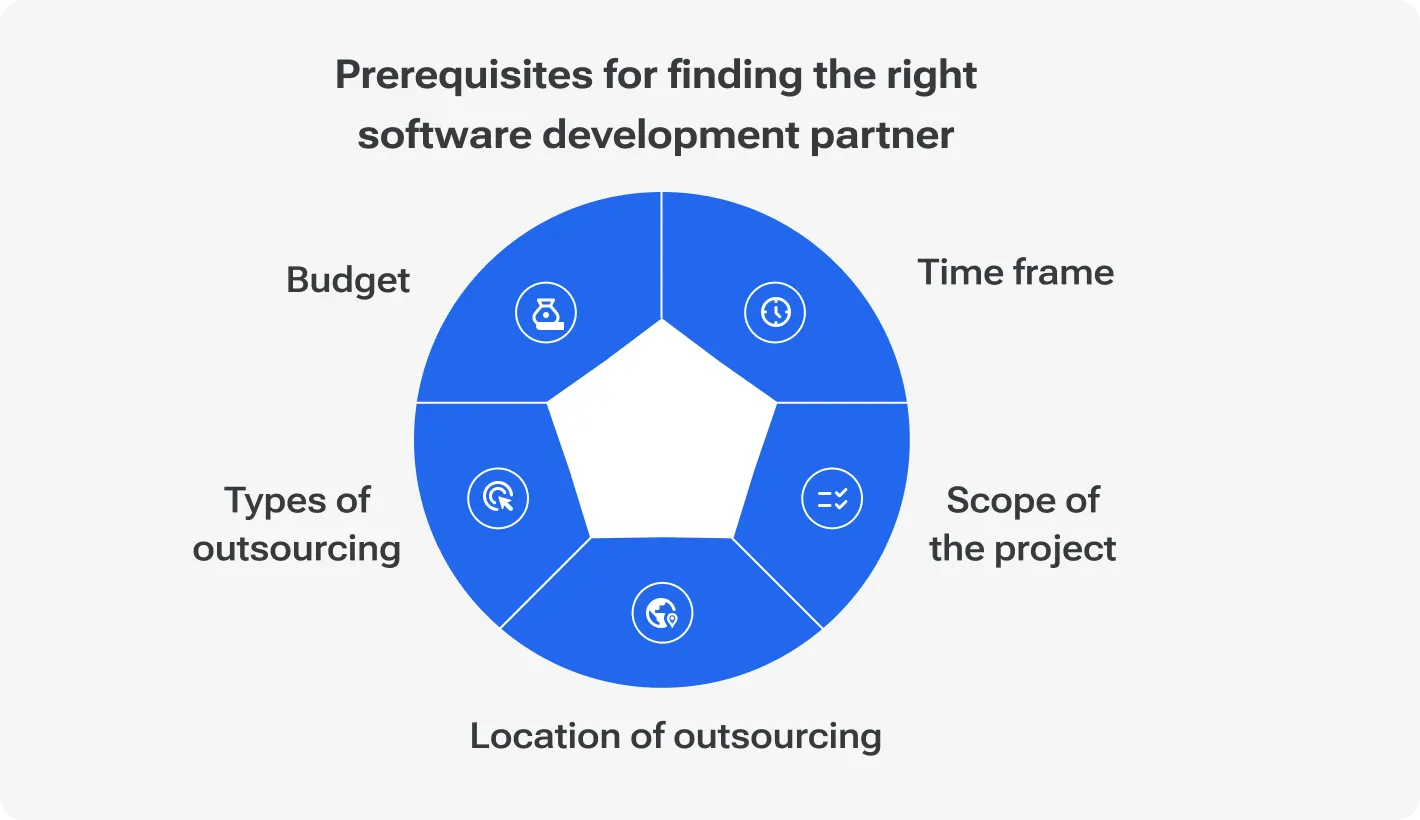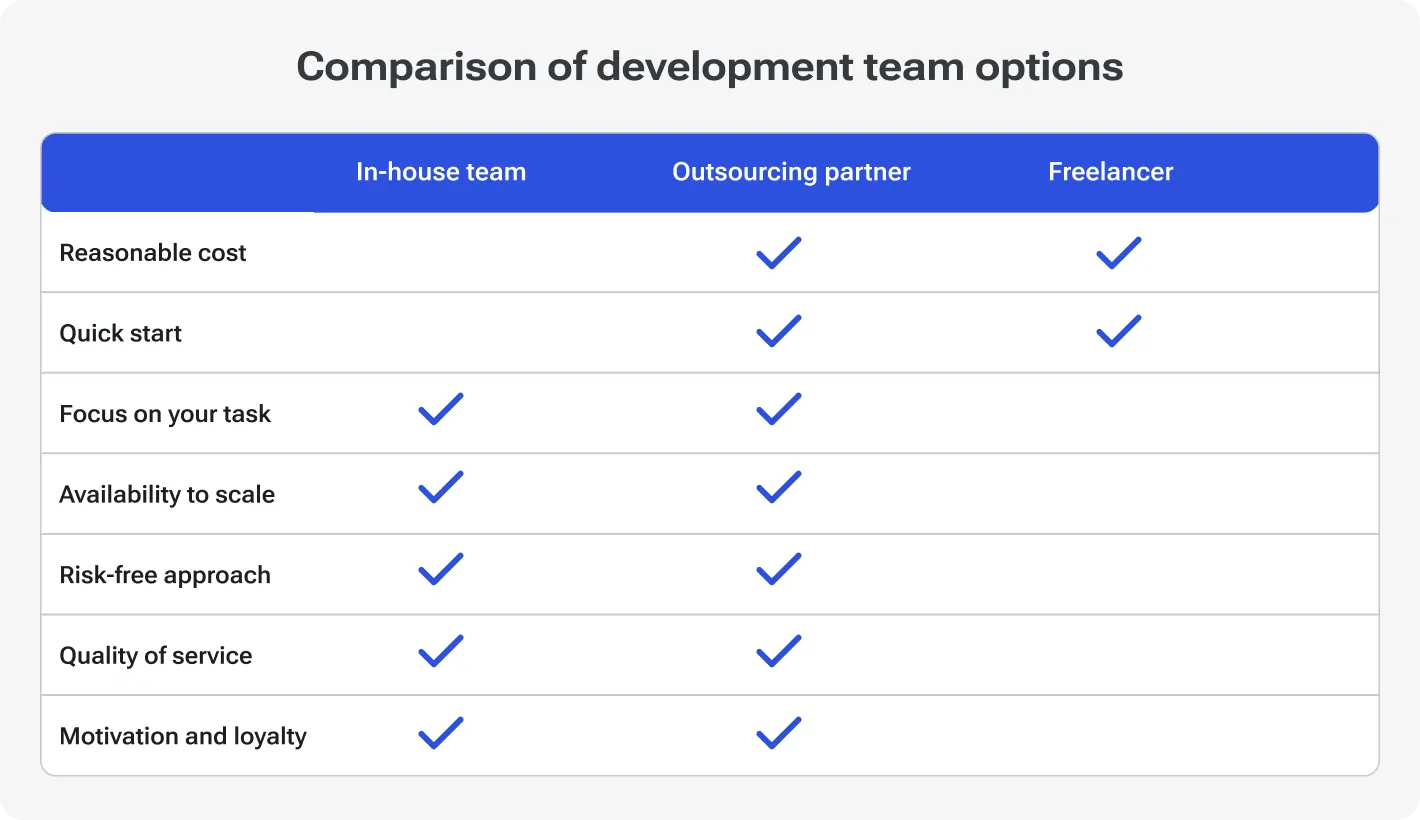Gartner reports global outsourcing is growing 8% year over year.For companies under pressure to scale faster and smarter, the message is clear: the right outsourcing model can make or break your next project.
But the outsourcing landscape is anything but static. From offshore development companies to freelance engineers, businesses are mixing strategies to secure the skills they need, when they need them.
As Satya Nadella put it, “Every company is a software company now.” The real question is: who should you trust to build yours?
In this article, we’ll break down the pros and cons of offshore development company vs freelancers, comparing cost, contracts, and capabilities to help you choose the model that fits your project best.
Motivated and focused experts for up to 60% less than locals, delivered in days, not months
Outsourced development partners
Businesses appeal to staff augmentation services as a proven strategy for accessing a global talent pool. Staff augmentation services handle regulatory issues and security protocols, which can mean a difference between compliance and non-compliance. Never underestimate the importance of regulation. That is why many clients use this model for long-term projects and expansion.
Offshore development companies offer services such as software development outsourcing and dedicated team development, to name a few. Essentially, they fill talent gaps really fast and keep budgets in check. With a good offshore development company, you can have many things covered — from compliance to a reliable offshore development team. As a client, you can focus on the core business functions and don’t worry about an augmented team breaching some confidentiality agreement or being sloppy when handling sensitive information.
As a nice bonus, many offshore development companies also provide Employer of record (EOR) services. EOR means third parties involved assume important legal responsibilities on your behalf. Such an option takes care of legal and payroll issues. For highly complex long-term projects, EOR as a part of offshore development strategy can save a great deal of valuable time and resources.
When to choose an offshore development company?
There are always several options on the table. When thinking about offshore development options, you need to consider these factors:
-
Project duration. If you need to build and maintain software over several years, it’s smarter to find outsourced developers through a structured partner.
-
Scalability requirements. If you require rapid team expansion or reduction. For example, when adapting to changing market conditions, you might need to scale your team up or down real fast.
-
Compliance, security, regulation. For projects with strict regulations. As we mentioned above, offshore development partners handle a lot of sensitive legal stuff.
-
Team management. When you want a smooth extension of your current team. Offshore development comes with long-term team extensions based on pre-vetted experts. No need to engage in a lengthy and costly hiring process.

One more thing, offshore development companies provide resources through well-organized processes and proven methodologies. The success of the aforementioned model stems from clear workflows as well as performance reviews, and many more things. In the end, staff augmentation partners support long-term growth and help manage regulatory issues.
Freelance developers services
Now, it is time to speak about freelancers. In some cases, freelance developers offer a more flexible way to fill talent gaps. You can go to Fiverr or Upwork and get a needed talent in terms of hours and not days or weeks. These professionals work on a project-by-project basis. They are popular for short-term tasks or when you need niche expertise for a short-term project.
Many companies use outsourced freelancers for tech projects to complete specific milestones quickly and cost-effectively. For a long-term project, it can be extremely risky because you don’t know how a particular expert will deal with complex tasks including multifaceted requirements.
In most cases, businesses decide to hire freelance developers when budgets are tight, and there is no light at the end of the tunnel. For a long-term project, it can be extremely risky to rely only on freelance offshore developers, as you don’t know how a particular expert will deal with complex, multifaceted requirements.
Clients often use freelance support to address short bursts of work or some non-standard project needs. In these cases, clear project guidelines and milestones matter. The clearer the task you give, the clearer results you receive.
When to hire freelance developers?
Freelance developers suit certain project types. Here are common scenarios:
Duration. If you have a project that is short-duration, freelancers can quickly deliver results.
Niche expertise. Finding a freelancer with targeted skills is beneficial for some niche tasks with specific project requirements.
Tight budgets. Initially, freelancers come at lower costs in comparison to long-term offshore providers.
Agile development. For projects that need quick adjustments or rapid prototyping, independent experts fit well.
Freelance work often relies on transparent communication channels and clear contracts, making it essential to apply strategies for outsourcing tech projects to freelancers. Keep in mind that they work well for projects with well-defined scopes and short timelines.
In the end, because you get freelancers from all over the world and do not have a clear idea of their methodology or quality, except for the client reviews that can be tweaked, having accurate communication is the key. Misunderstandings can cost a lot more than you save on freelancers.
Freelancers vs. outsourced development companies. Key differences
When choosing between an offshore development company and freelancers, several factors come into play. To give you a clear picture, we compare both variables on the following aspects:
-
cost-effectiveness;
-
quality of work;
-
communication;
-
reliability.
As you can see, it is all about how much it will cost you, what quality you will get, how hard the communication will be, and how reliable services will be delivered. Focus on these differences, you can decide which option suits your project best. Basically, it’s like putting together a puzzle or solving an equation.
1. How much will it cost you?
Naturally, cost plays a major role in any hiring decision.
Outsourced development companies:
Such an option provides structured processes and a dedicated software development team that may come with higher upfront fees. You need to pay for a staff augmentation partner’s services and cover some overhead costs. However, you must understand that costs cover legal, security, and management services. Remember, non-compliance and legal issues are way costlier than paying more for a solid partner.
Besides, companies that offer software development outsourcing handle many administrative tasks. It can be hiring, onboarding, termination, and many more. With an offshore development partner, you cover not only legal but also HR and recruitment bases. If you need a steady stream of work, you may find that partnering to find outsourced developers through a reliable company saves money over time.
Freelance developers:
As you probably know, freelancers usually charge on an hourly or per-project basis. Clients often search for outsourced freelance developers to lower initial expenses. If you have a tight budget and a small task to complete, the most reasonable way is to hire freelance offshore developers.
Yet, hidden costs can arise when freelancers require additional management or when projects need more oversight. For example, you might ask, how much do freelance web developers charge before starting a project? The answer depends on market rates and individual expertise. Believe us, those rates can fluctuate a lot. If you don’t know how to pick a freelancer, a cost-to-quality ratio can be volatile.
A key tip here is to compare the total cost of ownership for both options. Check out this outsourcing models guide for further cost comparisons.
In such a context, offshore companies may cost more initially. However, they offer fewer surprises. In turn, freelancers might appear cheaper but could lead to additional costs due to project management needs.
2. Quality of services and space for expansion
Quality and the ability to scale a project differ between the two options. Let’s take a closer look at the factor from several perspectives.
Outsourced development companies:
Staff augmentation companies offer services based on a dedicated offshore developers model. What does that mean? Simply put, it means you get a structured team in place. A structured team consists of pre-vetted experts who have already proven their expertise and talent. In turn, this translates into a consistently high-quality service delivery.
Besides, offshore development companies have code reviews and project management protocols. In other words, they make sure their dedicated teams stay at the top of the game and have all up-to-date tools to deliver top quality. This setup is ideal for projects that need to scale or require continuous development, something a dedicated offshore development team delivers better than freelance offshore developers.
Freelance developers:
Freelancers work independently. They do not belong to some structured team or dedicated staff. This might work well for small or experimental projects. However, maintaining consistent quality over a long period can be challenging. Freelancers have many projects on their hands and prioritizing the ones important to you is not their priority.
Working with hired freelance developers means you must manage each freelancer's output closely. In many cases, you might need to switch freelancers if the project scope grows. Naturally, shuffling between freelancers is not good for the quality of services. You often need to start the process all over and explain all the project requirements from the top.
In both cases, the key is to assess your project’s complexity. Projects that require a dedicated team may benefit from offshore development companies. In contrast, projects with limited scope can work well with freelancers.
Offshore development companies tend to offer more consistent quality and easier scalability. Freelancers
provide flexibility but can vary in quality over time. This trade-off should factor into your decision-making process. When it comes to quality, you need to be careful with your final decision.
3. Communication & control
Effective communication is critical for both models, especially when weighing offshoring vs. freelancing as part of your talent strategy. Without proper communication channels and common ground, it is virtually impossible to delegate tasks and make sure they are delivered as planned.
Outsourced development companies:
These companies use regular updates, project management tools, and clear reporting systems. When you hire offshore developers, you typically gain access to a whole team. These teams have already worked together and are used to communicating with one another. Such a structure also means you have a dedicated project manager and standardized communication protocols. Well-established communication channels are vital for remote-first work with experts from different time zones.
Freelance developers:
Freelancers work on their schedules. Communication is less structured. You may need to set up your own check-in processes. You might find that working with outsourced freelancers for tech projects requires extra effort to align work schedules and expectations. If clear, consistent communication is a must, the structured approach of an offshore development company may serve you better.
Overall, offshore development companies tend to offer better communication and control. Freelancers offer flexibility but require strong oversight from your side. Choosing the right model depends on how much control you want over the project — a structured offshore development company vs freelancers approach can make the difference.
4. How likely is the outcome you need?
Reliability is a key factor in any project. There is no other way to put it.
Outsourced development companies:
With these companies, you work with a team that remains dedicated over the long run. This model offers a predictable resource pool. When you choose to hire offshore developers, you also benefit from the company's reputation and standardized hiring processes. Their established processes mean fewer surprises in terms of availability and consistency.
Freelance developers:
Freelancers often juggle multiple projects, which may affect their long-term availability. You might need to repeatedly hire freelance developers for ongoing work, which can disrupt project continuity. While freelance offshore developers can be highly skilled, their commitment may vary based on workload and interest, making outsourced developers a safer option for long-term projects.
Here’s a comparison table to encapsulate what we’ve discussed above:
Offshore development companies vs freelance developers
Factor
Offshore development companies
Freelance developers
May have higher initial fees due to structured processes, legal support, and management. Often, fewer hidden expenses over time.
Typically charge hourly or per project. May seem cheaper initially but can incur extra costs from additional management and oversight.
Provide a dedicated team with regular code reviews and project management protocols. Ideal for long-term projects and continuous development.
Suitable for small or experimental projects. Quality may vary over time and may require switching freelancers if the project scope grows.
Offer robust communication systems, including regular updates, dedicated project managers, and standardized reporting.
Freelancers work independently, which may lead to less structured communication. You might need to establish your own check-in processes and protocols.
Ensure a dedicated resource pool with standardized hiring processes, resulting in predictable long-term availability and consistency.
May juggle multiple projects, leading to possible inconsistencies and lower long-term availability.
How does the offshore time difference work in your favor?
Decision-making criteria. Cost, terms, and skill set
Now, it is time to turn to a practical framework. Use this guide to match your project needs with the right talent.
Start by listing your project requirements. Identify whether you need a dedicated offshore developers group or if you can work with independent professionals like freelance offshore experts. During the process, think about the following criteria:
-
Cost. Compare the overall expenses. Look at hourly rates, project fees, and additional costs like management or training. Ask questions such as how much freelance web developers charge and compare those numbers to company rates.
-
Terms. Evaluate the contractual terms. Offshore development companies offer long-term contracts and clearly defined roles. Freelancers usually work on shorter agreements. Consider the level of commitment you need from your team.
-
Skill set. Assess the skills required for your project. A dedicated team from an offshore development company can offer a range of skills and offer backup if one member is unavailable. On the other hand, if your project needs very specific expertise, you may choose to hire freelance developers who specialize in that area.
A clear decision-making framework can save you time and money. Match your project needs with the right talent model.
Eight key project factors to keep in mind
Here, we offer a detailed guide to evaluating your project-specific needs.
Factor #1. Duration
For projects that span months or years, a stable team is critical. Offshore development companies usually deliver the consistency required. For short-term assignments, freelance developers may be a better fit.
Factor #2. Complexity
Complex projects that need varied expertise may benefit from a dedicated team. Staff augmentation companies gather and screen experts from various fields. If your project needs a specific skill quickly and for a one-time task, hire freelance developers with that expertise.
Factor #3. Budget
At first glance, tight budgets may lead you to the option of freelancers. But think about the hidden costs.. An offshore development company might have higher upfront costs but can save money over time. This is due to better project management. Plus, legal, HR and recruitment are already taken care of.
Factor #4. Oversight
Offshore companies typically offer better communication channels if you need daily check-ins and tight control over progress. Freelancer offshore developers require you to build your reporting structure.
Factor #5. Risk tolerance
Long-term projects are risky. If a key freelancer is unavailable, it can cause big issues. Offshore development companies help with continuity and managing risks. Think about how much disruption you can handle.
Factor #6. Technical compatibility
Check that your systems and tools integrate smoothly with the partner's technology. Ensure their development tools and methods match your project requirements.
Factor #7. Security
Check if your project handles sensitive data or needs strict compliance. Find a staff augmentation partner with strong security practices. They should meet your compliance requirements.
Factor #8. Flexibility/adaptability
Consider whether your project needs may change over time. A partner who adapts quickly to new requirements can help keep your project on track.
For more guidance on assessing project needs, learn how to get started with implementing the outstaffing model.
Evaluating project-specific factors is key. Look at duration, complexity, budget, control needs, and risk tolerance. These factors will guide you in choosing between an offshore development company vs freelancers, depending on project size, scope, and risk tolerance.
Conclusion
Choosing between an offshore development company and a freelance developer isn’t about right vs. wrong — it’s about fit. And now, you’ve got the framework to make that call with confidence.
Offshore development companies work best when:
You’re building long-term or large-scale projects
You need multiple skill sets under one roof
You value structured processes, QA, and project management
You want a scalable team that can grow with your needs
Security, compliance, and IP protection are critical
Freelance developers are a great fit when:
You need quick support for a short-term task
You’re building an MVP or exploring a proof of concept
You have internal team capacity for oversight and integration
Budget constraints call for lean, focused execution
You’re looking for very specific, niche expertise
Make the choice intentionally, whether you find outsourced developers via a structured partner or apply strategies for outsourcing tech projects to freelancers — and you’ll avoid project stalls, hidden costs, and mismatches.
End to end solutions with predictable budgets, a time to market advantage with budget savings of up to 50%





